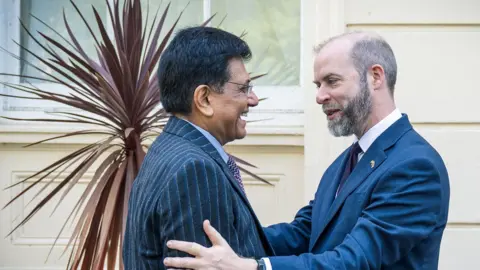Business reporter, BBC News
The UK and India have agreed a trade deal that will make it easier for UK firms to export whisky, cars and other products to India, and cut taxes on India’s clothing and footwear exports.
The British government said the “landmark” agreement, which took three years to reach, did not include any change in immigration policy, including towards Indian students studying in the UK.
Prime Minister Sir Keir Starmer said the deal would boost the economy and “deliver for British people and business”.
Last year, trade between the UK and India totalled £42.6bn and was already forecast to grow, but the government said the deal would boost that trade by an additional £25.5bn a year by 2040.
India’s prime minister, Narendra Modi, described the agreement as an historic milestone that was “ambitious and mutually beneficial”.
The pact would help “catalyse trade, investment, growth, job creation, and innovation in both our economies”, he said in a post on social media platform X.
Once it comes into force, which could take up to a year, UK consumers are likely to benefit from the reduction in tariffs on goods coming into the country from India, the Department for Business and Trade said.
That includes lower tariffs on:
- clothing and footwear
- cars
- foodstuffs including frozen prawns
- jewellery and gems
The government also emphasised the benefit to economic growth and job creation from UK firms expanding exports to India.
UK exports that will see levies fall include:
- gin and whisky
- aerospace, electricals and medical devices
- cosmetics
- lamb, salmon, chocolates and biscuits
- higher value cars
The British government said the deal was the “biggest and most economically significant” bilateral trade agreement the UK had signed since leaving the European Union in 2020.
UK Business Secretary Jonathan Reynolds said the benefits for UK businesses and consumers were “massive”.
Tariffs on gin and whisky, a key sticking point in negotiations previously, will be halved to 75%, with further reductions taking effect in later years.
Tariffs of 100% on more expensive UK-made cars exported to India will fall to 10%, subject to a quota limiting the total number.
The deal also includes provisions on the services sector and procurement allowing British firms to compete for more contracts.
Under the terms of the deal, some Indian and British workers will also gain from a three-year exemption from social security payments, which the Indian government called “an unprecedented achievement”.
The exemption applies to the staff of Indian companies temporarily transferred to the UK, and to UK firms’ workers transferred to India. Social security contributions will be paid by employers and employees in their home country only, rather than in both places.
The UK already has similar reciprocal “double contribution convention” agreements with 17 other countries including the EU, the US and South Korea, the government said.
However, leader of the opposition Kemi Badenoch described the agreement as “two-tier taxes from two-tier Keir”, with Labour’s increase in employer NI contributions from the Budget coming into force last month.
Shadow trade secretary Andrew Griffith said: “Every time Labour negotiates, Britain loses”.
Liberal Democrat deputy leader Daisy Cooper said it was “very worrying to hear concerns that Indian workers coming over here, companies may not have to pay taxes on those workers” and called for MPs to be allowed to vote on the deal.
The government said the National Insurance exemption would not affect NHS funding, since Indians working in the UK would still be required to pay the immigration health surcharge.
 UK Department for Business and Trade
UK Department for Business and TradeIndia, currently the fifth largest economy in the world, is forecast to become the third-largest within in a few years, making it a desirable trading partner for the UK, currently the world’s sixth largest economy.
The UK is also a high priority trading partner for Prime Minister Modi’s government, which has an ambitious target to increase exports by $1 trillion by 2030.
The deal is a win for free trade at a time when US President Donald Trump’s sweeping tariff campaign has put the idea on the defensive and raised fears of tit-for-tat trade wars.
It appears to have increased the impetus to strike this trade deal.
Rain Newton-Smith, chief executive of business lobby group, the CBI, welcomed the deal saying it provided a “beacon of hope amidst the spectre of protectionism” following Trump’s wave of tariffs.
UK businesses saw “myriad” opportunities in the Indian market, she added.
Allie Renison, from communications firm SEC Newgate, and a former government trade adviser, said the deal was potentially “transformational” due to India’s size, growth rate and relatively high existing barriers to accessing its market.


